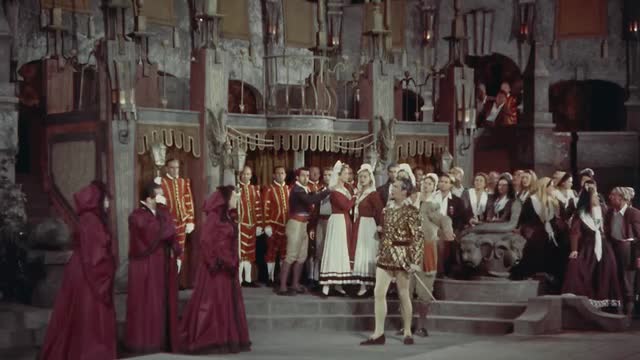Anton Dermota was born into a poor family: his father was a nail maker. Both his brothers, Gasper Dermota and Leo Cordes-Dermota, were also to become known as tenors. He entered the Ljubljana Conservatory, initially to study the organ and composition, and gained a scholarship in 1934 to study in Vienna, where he turned to vocal studies as a pupil of Marie Radó. He made his first operatic appearance at Cluj in Transylvania in 1934.
Heard by Bruno Walter soon afterwards, he was invited to sing at the Vienna State Opera, where he made his debut in 1936 as the First Armoured Man / Die Zauberflöte. Immediately offered a permanent contract, his first major role was Alfredo / La traviata in 1937, the year in which he also sang at the Salzburg Festival as Zorn / Die Meistersinger von Nürnberg, conducted by Toscanini. He quickly enjoyed further successes, at the Vienna State Opera as Lensky / Eugene Onegin and at the Salzburg Festival of 1938 in two roles that were to become central to his repertoire: Don Ottavio / Don Giovanni and Belmonte / Die Entführung aus dem Serail. The twin operatic centres of Vienna and Salzburg, where he became a great favourite with audiences, were to remain the focus of Dermota’s musical activity for the rest of his life.
During World War II Dermota remained active in Vienna, helping to save some of the furniture from the bombed and burning State Opera building in 1944. His loyalty did not go unnoticed and as early as 1946 he was given the honorary title of Kammersänger. He sang with the Vienna State Opera at its temporary post-war base at the Theater an der Wien and was a member of the company when it visited London in 1947, singing alongside Richard Tauber. At the reopening of the rebuilt Vienna State Opera in 1955 he sang Florestan / Fidelio.
Dermota’s repertoire at Vienna was remarkably varied and included Frank Martin’s The Tempest (1956), Alfred / Die Fledermaus, des Grieux / Manon (Massenet), Pinkerton / Madama Butterfly, Rodolfo / La Bohème, the Steersman / Der fliegender Holländer, David / Die Meistersinger von Nürnberg, Narraboth / Salome, Hoffmann / Les Contes d’Hoffmann, Hans (Jeník) / The Bartered Bride, Matteo / Arabella, Leukippos / Daphne and Mathias Freudhofer / Der Evangelimann (Kienzl); and towards the end of his career, the title roles in Smetana’s Dalibor and Pfitzner’s Palestrina. His Salzburg Festival roles were more traditional and included Don Ottavio (1938–1941, 1946, 1950, 1953–1954); Ferrando / Così fan tutte (1947, 1953–1957); Tamino / Die Zauberflöte (1951–1952); Jacquino / Fidelio (1950); Belmonte (1953); Cassio / Otello (1951–1952); Flamand / Capriccio (1954) and the solo parts in Verdi’s and Mozart’s Requiems, Rossini’s Stabat Mater (1952) and Schmidt’s Das Buch mit sieben Siegeln (1957).
Post-war international guest performances included appearances at La Scala, Milan (Don Ottavio, 1948); Rome, Naples and Paris (Tamino, 1953); and the Teatro Colón, Buenos Aires (Stravinsky’s Oedipus Rex, 1953).
In addition to his operatic work, Dermota was a most accomplished concert singer and was often accompanied in lieder recitals by his wife, the pianist Hilde Dermota, née Berger-Weyerwald. His concert tours included Australia (1954), Hungary and Czechoslovakia (1956). Heavier concert repertoire included Mahler’s Das Lied von der Erde and Beethoven’s Symphony No. 9 ‘Choral’, frequently with Herbert von Karajan conducting.
From 1966 onwards Dermota enjoyed a second career as a professor at Vienna’s Musikhochschule. To celebrate his seventieth birthday he was invited to sing Tamino at the Vienna State Opera, which he did with great aplomb; and in 1971, the year of his formal retirement, he sang the Shepherd in Carlos Kleiber’s studio recording of Tristan und Isolde.
Dermota was one of the outstanding lyric tenors of his generation: his voice combined a smooth line with a gleaming and, at times, Slavic edge that together were most appealing. As a central member of the Vienna ensemble of the 1950s, he featured extensively in Decca’s operatic recordings of the time and his art as a pre-eminent exponent of Viennese musical culture is extremely well-documented.
© Naxos Rights International Ltd. — David Patmore (A–Z of Singers, Naxos 8.558097-100).
| Title | |
| MOZART, W.A.: Don Giovanni (Furtwangler) (Salzburg Festival, 1954) | |

|
MOZART, W.A.: Don Giovanni (Furtwangler) (Salzburg Festival, 1954)
Composer:
Mozart, Wolfgang Amadeus
Artists:
Berger, Erna -- Berry, Walter -- Della Casa, Lisa -- Dermota, Anton -- Edelmann, Otto -- Ernster, Deszo -- Furtwangler, Wilhelm -- Grummer, Elisabeth -- Siepi, Cesare -- Vienna Philharmonic Orchestra -- Vienna State Opera Chorus
Label/Producer: UNITEL |
